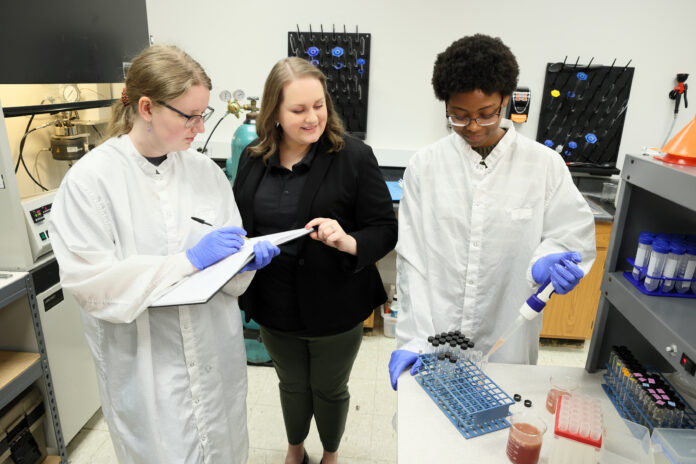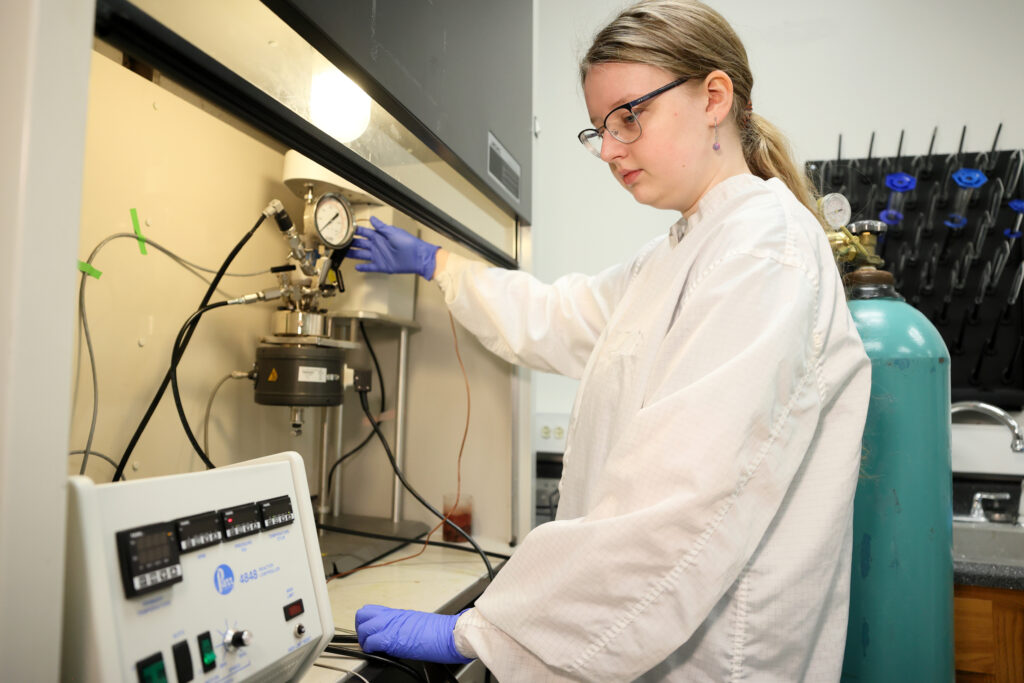
Dr. Sarah Bauer, assistant professor of environmental engineering, and a team of mostly undergraduate students have been awarded nearly $75,000 by the U.S. Environmental Protection Agency (EPA) to further their research studying and identifying sustainable fuel alternatives.
“This research is not being led by post-doctorate students. It is not being led by Ph.D. students,” said Dr. Bauer. “The innovative research that we are going to be completing through this grant project and disseminating to the research field and the EPA is being completed by my team of primarily undergraduate students. This grant is a great opportunity, specifically for a university like Mercer and its School of Engineering, that is primarily focused on undergraduate research opportunities and experiences.”
Environmental, mechanical and biomedical engineering students are participating in this research project under Dr. Bauer’s leadership, and over a two-year period, six students will have opportunities to work on it.
The grant was awarded as part of the EPA’s P3 – People, Prosperity and the Planet – Program, which is aimed at college students interested in creating innovative solutions to the most pressing environmental and public health challenges. Since 2004, the P3 program has involved thousands of students and provided more than $18 million in funding for more than 800 projects, at more than 330 institutions in all 50 states and Puerto Rico.
In the program, teams of students work to design innovative solutions for a sustainable future. The EPA describes the program as offering students “hands-on experience that brings their classroom learning to life, while also allowing them to create tangible changes in their communities.”
Dr. Bauer’s research team’s project, titled “Navigating the Food-Energy-Water Nexus through the Conversion of Food Waste to Biocrude,” investigates the sustainability of biofuels derived from food waste streams.
“With this grant, we are working on conducting experimental laboratory research to see if we can take a specific subsection of waste –specifically food waste –and use it to create a renewable energy source,” said Dr. Bauer.
Dr. Bauer added that her team is specifically looking into waste from the beverage industry and is working with local coffee shops, wineries and breweries in the Macon area.
“Such waste streams are an untapped market in this research area and in the research that has been done by myself and other researchers in the past years,” she said.

The only graduate student on the project, environmental engineering master’s student Madalyn Nesheim, said the project appealed to her on several levels.
“I have always enjoyed being in a research setting, so this project was perfect for me. It was in my major, I got to use some of my chemistry knowledge and it helped really solidify my desire to one day pursue a Ph.D. in my field.”
Senior environmental engineering major Leila Kelly said she wanted to join the project because she was intrigued to learn more about converting food waste to energy.
“I really like the idea of doing research with sustainable processes and sustainable materials,” she said. “That is what I want to study in the future – sustainable engineering.”

The team said its early experiments have already shown some promising results and have performed better than expected. Kelly said being able to conduct this research has allowed her to explore different areas of environmental engineering.
“Being a part of this project has changed my notion of what environmental engineering could be,” she said. “It has allowed me to see different career paths that I could take, especially with going to graduate school in the fall. I have been able to get a glimpse of different projects and different research that is available within my field.”
The team’s project description submitted to the EPA states, “The results of this project have the potential to revolutionize the world in terms of creating an innovative solution to the challenges of the Food-Energy-Water Nexus.”
“At Mercer, one of our biggest goals is the undergraduate student research experience,” said Dr. Bauer. “This project is about society as a whole and about ways to make engineering practices more sustainable for the future of our world. And our undergraduate students at Mercer get to be at the forefront.”









